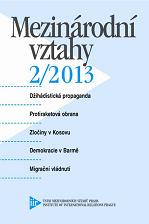Od hrozby k příležitosti: Vede nedostatek environmentálních zdrojů ke spolupráci?
From Threat to Opportunity: Does a Lack of Environmental Resources Lead to Cooperation?
Author(s): Šárka WaisováSubject(s): Politics / Political Sciences
Published by: Ústav mezinárodních vztahů
Keywords: environmental cooperation; conflict; China; Taiwan; Palestine; Israel; non-tradeable natural resources
Summary/Abstract: The research of the relationship between conflicts and natural resources has been dominated by an understanding of natural resources as a cause of conflicts, and the term “conflict resources” has been used in connection with this. Here I offer another approach and present the hypothesis that a lack of environmental resources (environmental resources and raw materials are together understood as natural resources) and environmental degradation can offer a peace-building opportunity. I argue that environmental resources are not transportable, extractable or lootable, which decreases their market significance. At the same time, the conflict-prone communities are aware that non-tradeable goods play a vital role in their life and the quality of the goods depends on the collaboration among all the actors in the region. This situation results in so-called “environmental interdependence”. Environmental interdependence works as an impulse for cooperation across the cleavage lines. The hypothesis is tested on two case studies – that of the relationship between Israel and Palestine and that of the relations between mainland China and Taiwan.
Journal: Mezinárodní vztahy
- Issue Year: 48/2013
- Issue No: 3
- Page Range: 32-61
- Page Count: 30
- Language: Czech

